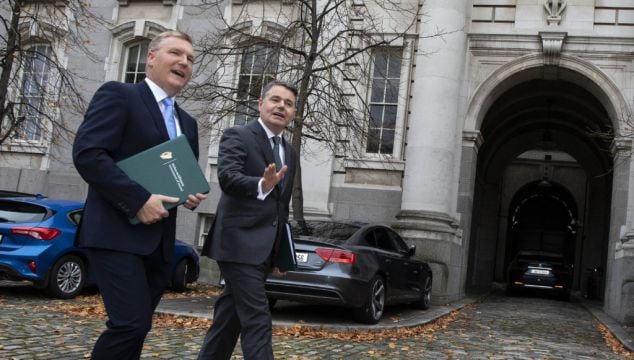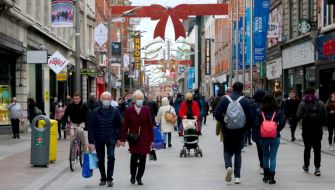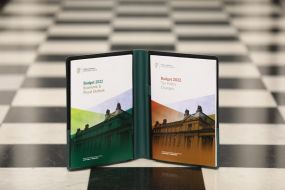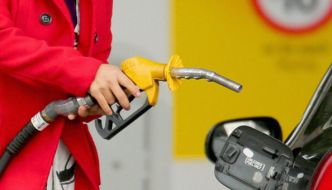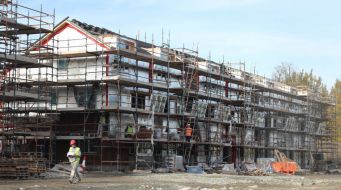An income tax reduction to cover the cost of domestic bills for remote workers and a €4 billion Covid-19 contingency fund form part of the multibillion spending package announced as part of Budget 2022.
The Minister for Finance, Paschal Donohoe, said the State was now entering “a new phase” in which the country will recover from the pandemic, restore public services and repair public finances.
Unveiling the Budget for 2022, a package that amounts to €4.7 billion, Mr Donohoe said the Government was “conscious” of the cost-of-living pressures on the public and businesses.
What’s in Budget 2022?
- Tax deduction of 30% on heat, power and broadband costs for remote workers
- Reduced VAT rate of 9% for the hospitality sector to remain in place until the end of August 2022
- Minimum wage to rise by 30 cent to €10.50
- Petrol and diesel prices to increase – diesel up by 2.5 cent a litre, petrol up 2.1 cent
- Cost of 20 cigarettes has increased by 50 cent but alcohol prices remain unchanged
- Carbon tax will rise by €7.50 per tonne
- Young adults aged 19-23 to get a 50% reduction in public transport fares
- Free GP care extended to children aged 6 and 7
- Weekly pension will increase by €5, while the weekly rate of the fuel allowance is also up €5
- Free contraception for women aged 17-25, as part of €31 million women's health package
Read more – Budget 2022: The main points and what it means for you
Welfare payments including the fuel allowance are to increase by €5, while young adults aged 19-23 are set to get a 50 per cent reduction on public transport.
Remote working is to be further encouraged by the granting of the 30 per cent income tax reduction to account for increases in heat, electricity and broadband costs.
“This will support living standards as the economy starts to recover. However, it will also be kept under review from the perspective of its interaction with the National Climate Policy Position,” Mr Donohoe said.
Minister @Paschald has announced an income tax deduction amounting to 30% of the cost of vouched expenses for heat, electricity and broadband in respect of those incurred while working from home #Budget2022 pic.twitter.com/KSjakSOBJT
— Department of Finance (@IRLDeptFinance) October 12, 2021
Mr Donohoe also announced a €4 billion Covid-19 contingency fund that can be used if the Covid-19 situation worsens again in the months ahead.
The Christmas bonus is to be paid in full to social welfare recipients and the fuel allowance is set to increase by €5.
While the increase in the fuel allowance will come into effect from the night of the budget, the €5 increase for pensioners, jobseekers and other welfare recipients will come into effect from January.
There will be €194 million for homeless services, €18 million for Traveller accommodation schemes, €65 million for housing adaptation grants and €85 million for retrofitting. The help-to-buy scheme will be extended for 2022 but will be subject to review.
The State’s support scheme for businesses, the employment wage subsidy scheme, will be extended to next April but will begin to be tapered from December. Income tax relief will be provided in the form of indexing tax credits and bands to help offset the impact of inflation on people’s take-home pay.
An additional 800 gardaí will be recruited next year. Some 400 Garda civilian staff will also be recruited, bringing the total level of Garda staff to 3,800, the highest-ever number.
Healthcare
The Department of Health is set to receive less than €1 billion in direct Covid-19 funding next year, down from €2 billion last year.
A renewed focus on medical waiting lists will see a funding package of more than €200 million mobilised to tackle backlogs.
Free GP care for children up to the age of seven was announced by Minister for Public Expenditure Michael McGrath.
There will be a cut to hospital charges for children and funding for disability services will increase by about €100 million.
The limit for the Drug Repayment Scheme is to be reduced to €100 from €114.
A pilot basic income scheme for artists will begin in January as well as a €25 million fund to help venues hold events after they reopen towards the end of the month.
A pack of 20 cigarettes has increased by 50 cent but alcohol prices stay unchanged. Carbon tax will rise by €7.50 per tonne as part of efforts to reduce greenhouse gas emissions by 7 per cent per year.
The VRT exemption is to be extended for two years for electric cars.
All young adults between the ages of 19 and 23 inclusive are to get a 50 per cent reduction in all public transport through a “young adult card for public transport”.
Employment figures
In his Dáil speech, Mr Donohoe said that by the end of the year, the rate of unemployment is forecast to be just over 9 per cent, and employment is forecast to grow by about 8 per cent or around 150,000 jobs.
Next year, the unemployment rate is expected to fall to about 6.5 per cent, and employment is expected to grow by more than 13 per cent.
He said that more than 400,000 jobs will be added to the economy between this year and next.
Public spending next year will amount to €87.6 billion.
Mr Donohoe added: “In the Summer Economic Statement, my department forecasted a combined deficit of just over €34.5 billion for 2021 and 2022.
“I am revising that forecast to €21.5 billion for both years, a reduction of 40 per cent.”
Taoiseach Micheál Martin said the Budget will “consolidate” the State’s economic recovery as it emerges from the pandemic.
